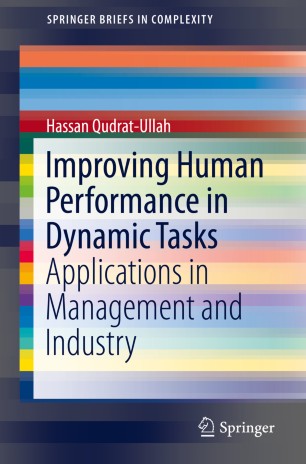A new book on improving human decision making and performance in complex, dynamic tasks is the result of research conducted by York University Professor Hassan Qudrat-Ullah.
Qudrat-Ullah, who teaches in the Faculty of Liberal Arts & Professional Studies’ School of Administrative Studies, demonstrates the utility of laboratory-based experimental methods in dealing with dynamic tasks in his book Improving Human Performance in Dynamic Tasks.

The defining characteristics of a dynamic decision task are that there are a number of decisions required, that decisions are interdependent, and that the environment in which the decision is made is transient and feedback is pervasive. Examples of dynamic tasks include the sustainable management of renewable resources and how businesses might allocate resources for research and development projects.
Improving human performance in complex, dynamic tasks has always been at the forefront of both research and practice of organizational decision making, and simulation-based education and training is a multibillion-dollar industry. The purpose of this book, says Qudrat-Ullah, is to provide the reader with knowledge about the design, development, validation and application of an innovative, system dynamics-based interactive learning environment that includes a systematic debriefing.
A laboratory experiment is reported in which the participants managed a dynamic task by playing the roles of fishing fleet managers. A comprehensive model consisting of the following five evaluation criteria is developed and used: task performance, decision strategy, decision time, structural knowledge and heuristics knowledge.
The key insights gleaned from the empirical data include the following:
- The process-oriented debriefing improves subjects’ performance better than the outcome-oriented debriefing.
- Contrary to the cost-benefit approach to decision making, more systematic effort is needed to perform better in dynamic tasks.
In the quest for innovative solutions for the education and training of people in dynamic tasks, the book outlines many challenges that lie ahead. Specifically, as we move towards displacing the traditional thinking that people perform poorly in dynamic tasks, founded in dominant dynamic decision-making literature, to one where plural logics of “systematic debriefing-based training with SDILEs” coexist under conditions of uncertainty and ambiguity, the need for systematic and integrated solutions for improving human performance in dynamic tasks becomes pronounced.
The goal was to focus attention on the whole virtuous cycle of expertise development: decision making to learning to decision making.
This book aims to stimulate a new way of thinking as a proclamation of a new era of resource constraints and a renewed focus on integrative solutions for people’s education and training in dynamic tasks.


